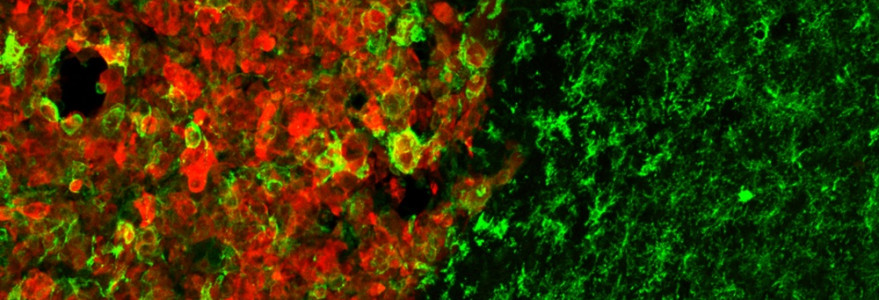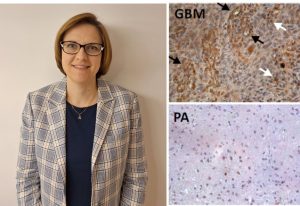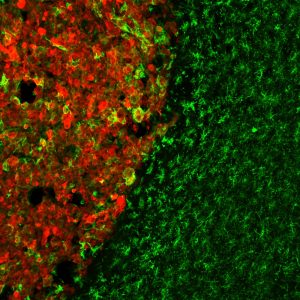Biologists from the University of Warsaw made a breakthrough discovery during the research on glioblastoma. The results were presented in the journals “EMBO Reports” and “Cell Death and Disease”.
Glioblastoma is the most common and lethal brain tumour. Its diffusive growth and therapy resistance makes it one of the greatest medical challenges in the field of oncology.
Vital receptor
The breakthrough in the research on glioma pathogenesis was made by Prof. Anna Malik from the Faculty of Biology, the University of Warsaw. The research was carried out by the Cellular Neurobiology Research Group from the UW’s Faculty of Biology, as well as scientists from Poland, Germany, Netherlands and Denmark.
“The main reason for a negative prognosis in glioblastoma is a faulty response of the immune system against the tumour. Paradoxically, the cells that should hinder the glioma development are involved in supporting its growth. This phenomenon is caused primarily by microglia and macrophages, which acquire pro-tumour properties in the glioma microenvironment and become its allies. We have discovered that the receptor SorLA has an important role in this process. A high or low level of expression of SorLA gene-coding is linked to specific properties of cells: pro-tumour or pro-inflammatory,” Prof. Anna Malik underlined.
The results of the research were presented in EMBO Reports:
“SorLA restricts TNFα release from microglia to shape a glioma-supportive brain microenvironment”
Tumour inhibition
The novelties regarding the treatment of patients with glioblastoma include the discovery made by Dr Marta Maleszewska from the Faculty of Biology. Her research was carried out together with a team of scientists from the Nencki Institute of Experimental Biology, the Maria Sklodowska-Curie National Research Institute of Oncology, and The Children’s Memorial Health Institute.
“The tumour progression and chemotherapy resistance are caused by glioma stem-like cells. We have discovered that their ability to proliferate is inhibited by the knock-down of the transcription factor called DMRTA2. The research results indicate that the DMRTA2 factor could be involved in the formation of new blood vessels to supply the tumour with nutrients. This factor could become a biomarker and a potential target for new therapeutic strategies in glioblastoma,” Dr Marta Maleszewska emphasised.
The results of the research were presented in Cell Death and Disease:
“DMRTA2 supports glioma stem-cell mediated neovascularization in glioblastoma”






